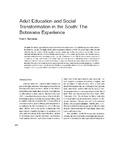| dc.contributor.author | Maruatona, T. | |
| dc.date.accessioned | 2012-11-15T12:54:31Z | |
| dc.date.available | 2012-11-15T12:54:31Z | |
| dc.date.issued | 2010-11-23 | |
| dc.identifier.citation | Tonic L. (2010) Adult education and social transformation in the south: the Botswana experience, The Journal of Continuing Higher Education, Vol. 58, No. 3, pp. 167-179 | en_US |
| dc.identifier.uri | http://hdl.handle.net/10311/1048 | |
| dc.description.abstract | The article argues that, historically, universities have served a select few individuals as part of modernist not transformative agenda. This highly selective process guarantees students good life. The article argues that university education helps to redress colonial inequities through creating opportunities for graduate employability. However, university education has also served conflicting roles of adhering to the global capitalist imperative and attempting to inculcate social inclusion in developing nations. The roles of university-based adult education is analyzed in terms of its curricula, teaching, and research to demonstrate that adult education serves officialdom and has strayed from the initial adult education focus of social transformation. Drawing some illustrations from the Department of Adult Education at the University of Botswana, the article argues that programs serve state interests through engaging in a neoliberal modernist curriculum that excludes the learners. Finally, it is suggested that adult education should rethink the curricula, strengthen civil society, and mobilize community for social transformation. | en_US |
| dc.language.iso | en | en_US |
| dc.publisher | Taylor & Francis, http://www.tandf.co.uk/journals | en_US |
| dc.subject | Adult education | en_US |
| dc.subject | Social transformation | en_US |
| dc.subject | Botswana | en_US |
| dc.title | Adult education and social transformation in the south: the Botswana experience | en_US |
| dc.type | Published Article | en_US |
| dc.link | http://dx.doi.org/10.1080/07377363.2010.502853 | en_US |

